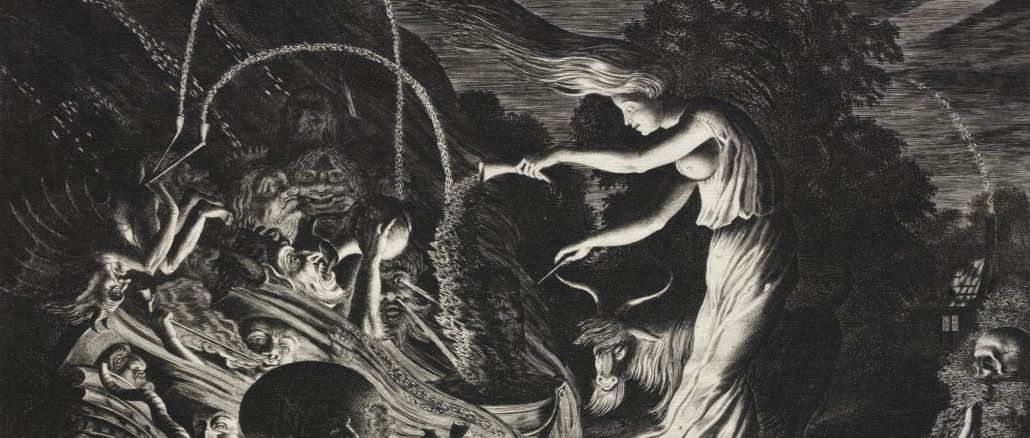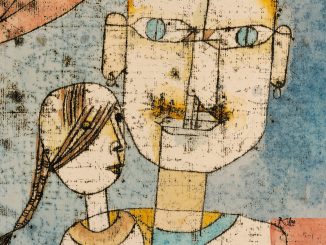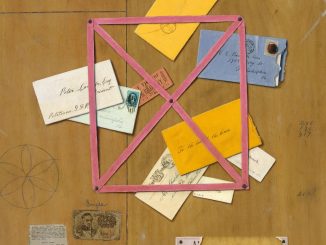
La Jetée is a 1962 French speculative fiction featurette by Chris Marker. Told almost entirely in black-and-white stills, it follows a prisoner in post-World War III Paris. In this bleak landscape, scientists us prisoners of war as test subjects in their research of time travel.
But who will mentally withstand the shock of time travel? Who could?
The scientists find a prisoner tied to the past. The prisoner is intrinsically linked to a fragmented series of images from his childhood. An airport. Empty space. A platform. Empty space. A woman. Empty space. He remembers the woman wearing a black turtleneck. Her dark hair stirs in a breeze. She cups her hands around her face. Her mouth is half open, as though she is about to speak, or perhaps scream. Something terrible has happened. Something terrible is about to happen. He thinks. He doesn’t know.
He remembers that her eyes are kind. He thinks. Or does he? Does he remember the woman, at all? Does he so yearn for tenderness in this post-war wasteland that his mind has invented a childhood image of kind eyes? He remembers death through a haze of fear. The war. The destruction of Paris. The destruction of everything. The narrative of his life is marred by the temporal staccato of the trauma of living.
***
I am walking in the woods around my childhood home. The coastal forest is hushed in the morning fog. Mist settles into my hair. I marvel at the pale green moss that drapes over the branches like lace. The trees are old. Some are already dead, their bark peeling away to expose grey flesh. A breeze sweeps through the grove. The trees creak and croak. It sounds as though they are screaming.
I am following a trail of disappearing footprints. I am lost. That isn’t right. I’ve lost something. That isn’t right. I’ve lost someone. I scale a muddy hill. The light brown suede of my shoes is swallowed by dark goop with a squelch and a squelch and a squelch. At the peak, I look out over the trees and spot the Pacific Ocean. A crack has formed in the grey sky allowing a ray of light to illuminate a patch of sea. I have never seen anything so blue.
***
The girl is six, or maybe seven. She is pale and scrawny, with a mess of ripened-wheat hair that dangles past her waist. She plays in a gated yard full of fruit trees. The garden is untended. Plums, apricots, and granny smith apples fall from the trees and rot on the ground. She treads on them as she runs. She scrambles up a large rock and pretends to be a sea captain at the stern of a ship. She yearns to be strong and brave. She plucks apples and wraps them in paper towels. She carries these in her Little Mermaid backpack around the yard. Her fuel for an as-yet-unknown quest. She has learned that the dog will try and steal her soccer ball, so she runs up and down the lawn, pretending he is an opponent. She climbs a tree with a decrepit treehouse at the top. The structure is little more than nails sticking out of wood. The yard has a tire swing with groaning ropes. She twists herself up, releases, and spins and spins. She climbs a fig tree. She falls and lands with her armpit wedged between two branches, the wood peels the skin from her side as she slithers out of the branches and descends. She gathers rocks and flowers for a fairy circle. She hopes the fairies will come to sing and play. She is tired of being alone. The circle is broken the next morning. The flowers have gone brown. She worries that the fairies fear the stench of the dead. She heard that phrase on a TV set in the den before she was shooed from the room. She cries, apologizing to her fairy friends.
***
A woman with memories made of a dawn mist squints to see the girl playing in a gated yard full of fruit trees. A woman is frightened. A woman’s left eye starts to twitch. A woman watches the girl climb a tree. A woman watches the girl twist herself up in a tire swing and spin and spin. A woman’s stomach drops from beneath her and nausea grips her throat. A woman watches the girl fall. A woman’s skin rips open and peels pink innards exposed.
***
My therapist calls my memory gaps “protection.” She asks me questions about my life. I do not have the answers.
The girl. Empty space. A woman. Empty space. Me. Empty space.
These are the things I remember. I think. I don’t know.
You are very well protected, she says.
***
The girl is eight, or maybe nine. She walks into a house. It is large and quiet. It is full of dark wood panelling and Persian rugs. It is full of dusty rooms that are not to be entered and fragile treasures that are not to be touched. She tiptoes to her room so as not to scratch the hardwood. The carpet of her bedroom is plush pink. The walls are covered in vibrant neons. Her twin bed is canopied dusty rose. She has inherited a closet full of clothes from the 80s, and sometimes she likes to put on a peacock coloured suit with large shoulder pads and pretend to be a lady detective. The girl’s grandparents pick her up from soccer practice. Her grandfather scolds her because she won’t stop dancing long enough to come to the table for dinner. When she finally sits, her grandmother pours her a glass of Squirt and her grandfather gives her a taste of his beer. The girl wrinkles her nose and asks why he drinks something that tastes like pee. He laughs. Later, they dance together to “As Time Goes By” and he tells her to beware handsome crooners with crooked smiles. Her grandmother makes her scrambled eggs in the morning. Her grandfather teaches her to shift gears in the car as he drives her home.
***
The prisoner is frightened. The scientists have told him that the human race is doomed. Nuclear war has ravaged the earth. The last hope for survival lies in time. Through time travel, it just might be possible for the human race to reach food, medicine, sources of energy.
But, the scientists explain, only those with a strong tie to the past can achieve time travel. Individuals intrinsically linked to their past are more likely to be successful in moving outside of time.
And so, the scientists start the first experiment. It doesn’t seem to work, until it does.
***
On the tenth day, images begin to ooze, like confessions.
***
The girl fidgets at her piano lesson. She never practices. Her instructor, Demitri, has a drooping face covered with acne scars and a nervous stutter. He stutters more when he is frustrated, and his instructions sound like a ticking metronome with a Russian accent. Her parents work in tall offices in noisy cities. Like twilight, they appear at dawn and dusk. The girl has a nanny. An intense and petite woman who is wound like a spring. The girl becomes accustomed to hiding in mothball closets. The girl hears scratching from the floors at night. She recites the Lord’s prayer over and over again to keep the demons from clawing their way to her bed. At school the boys call her a crybaby. This makes her cry. During a math lesson, the girl daydreams that she is a Lady Knight. Lady Knights do not cry. They joust. She doodles a horse on her desk. She gets into trouble with the teacher and is overcome with panic. It sweeps through her system in a tide of red hot anxiety which bubbles up her throat and emerges from her mouth as sobs. This gets her into more trouble.
***
The man has become unstuck in time. He looks for the woman with the kind eyes. She is the only thing that he is sure of in his new, dateless world. He speaks to her. She smiles. They are in a garden. He remembers there used to be gardens. He thinks. They walk. They go on walks. What day is it? It is cold outside of time. She listens. She doesn’t laugh. They walk until he finds ahead of him, ahead of them, a barrier.
***
This is the end of the first experiment.
***
The girl is ten, or maybe eleven. She is too tall. She grows with abandon, first in height and then in girth. She is too big. Her mother removes junk food from the house, and the girl learns to survive on Diet Coke and honeydew melon. She shrinks in posture and in girth. The girl dreams of being chased by a demon and wakes to the ache of the hollow in her gut. The girl auditions for a Shakespearean play. Her grandparents come opening night and sit in the front row. Later, her grandfather tells her that he didn’t understand the play, but he knew that she was wonderful. He wiggles his fingers at his eyes and then points to her. You’ve got the stuff, kid, he says. You’re a star. The girl feels a warm glow. The girl believes the unfinished basement of the house is haunted. She explores its depths and uncovers dead rats and corners twisting with cobwebs. The girl finds graffiti on the walls. She follows the words and clambers into the crawl space beneath the house. She wills herself to be brave. She is a warrior. A wizard. A knight. Her elbows crunch on damp gravel as she moves forward. The graffiti turns from white to red. She finds herself in an open space, somewhere beneath the structure of the house. She lifts the flashlight around the room and lingers on words written in red paint. Help me. I’m trapped. She drops the flashlight and swallows a scream. She shimmies her way back through the crawl space in the dark. Later, she is scolded for the dirt beneath her fingernails.
***
A woman watches the girl walk into a house. A woman watches the girl walk into her bedroom followed by a demon with eyes but no face. The demon turns to look at a woman. The demon is an emergency room at 3 am. The demon is the choking breathlessness that comes just before a sob. The demon is the crackling of a truth that cannot be unsaid. A woman tastes acrid air and the vinegar of bile. A tremor wracks a woman’s body, bones clacking, threatening to break apart at her fault. Panicked, a woman closes her eyes and slams the door on the girl and her pink bedroom with neon walls.
***
This is also the end of the first experiment.
***
The scientists conduct a series of tests on the man. He meets the woman again and again. She calls him her Ghost. They meet in a museum filled with timeless animals. He remembers there used to be museums. He thinks. He yearns to stay in these moments. He yearns to become stuck in time again. A different time. A better time. In this temporal vertigo he has become both the child he was the first day he saw the woman and the man who has become her ghost.
***
A woman cannot see the girl and her demon, anymore. A woman has slammed too many doors. But a woman can still feel the girl. A woman feels the girl when a man scolds a woman for biting her nails and she flinches in reply. She feels the girl in the oblong bruises on her wrists. She feels the girl next to her in a closet crying, feels her, until a woman is too deep inside of a glass bottle to feel.
***
The girl is eleven, or maybe twelve. She wears an electric blue t-shirt with mesh sleeves. She is walking down the stairs when she notices that her breasts are jiggling. She is getting ready for a school dance. She is wearing a light blue tank top embellished with a rhinestone butterfly. She is listening to Backstreet Boys. She dances in front of the mirror, and waves her arms in the air. She notices a single hair on her armpit. In gym class the girls study each other’s bodies as they change into heavy blue t-shirts with pictures of Vikings and baggy yellow shorts. She uses shoulder pads she’s snipped from the old blazers in her closet to stuff her new bra. There is a boy with a learning disability in her class. She is kind to him, or at least she tries. The boys ask if she wants to blow him. She doesn’t know what that means. The boys laugh. She is relieved when the school year slips into a sweat-soaked summer. The girl wishes she was at the pool. Instead she is at a hospital that smells of chemicals and stale sweat. Engulfed in beeping machinery and grave-faced aunts and uncles her grandfather looks small. He wiggles his fingers at his eyes and then points to her. I love you too, she wants to say, but she is too scared. She ducks her head and starts to cry. Her grandfather’s skin turns parchment yellow. She sings “As Time Goes By” at his funeral.
***
Back in the experiment room, the man knows that something has changed. The scientists tell the man that they will attempt to send him to The Future. The man reaches the gates of the future, through planets that might be and worlds that no longer are. The gates of The Future are well protected from the past. But once they are opened to him he sees the proof that humanity has survived.
The man returns to the present with the aid of The Future. He is once more a prisoner of war. The images of his childhood still haunt him. An airport. Empty space. A platform. Empty space. A woman. Empty space. He yearns to be reunited with something within him, to reconcile the memory of a twice-lived fragment of time.
***
There is a picture of the girl. She is two or maybe three. She is wearing a white t-shirt under denim overalls and a ball cap embroidered with pearls cocked jauntily to the left. Her wispy hair is straw blonde. She’s climbing a fence and sticking her tongue out at the camera.
I peer through mist at a lost girl dancing. More than anything else, I want to join her. I want to hold her hand and dance until we forget time. I want to dance until we lose our demon, lose everything but melodic laughter and nimble steps, the taste of fresh-plucked mint and just-ripe magenta plums, the feeling of damp soil beneath bare feet and the breathlessness of a single giddy twirl.
***
Deep in the dissonance of temporal vertigo, the man receives a message from The Future. They invite him to join them. Instead, he asks to be returned to his childhood, and to the woman with the kind eyes.
An airport. A platform. A woman. It is a warm pre-war Sunday afternoon. He realizes that the child he once was must be there too, watching the planes. He searches for the woman’s face. He runs towards her. And it is just then, as the woman looks on, her dark hair stirring in a breeze, her mouth is half open, as though she is about to speak, or perhaps scream, that the man sees the officer who has followed him from the prison camp.
An airport. Empty space. A platform. Empty space. A woman.
In the empty spaces his childhood self watches the death of the man and the child.
***
Somewhere a woman is crying from inside of a glass bottle. A demon still chases her, but she has nowhere left to run. She grips her hands together in prayer and opens her mouth. But she can’t remember the Lord’s Prayer. She swallows metallic air and stares up into the demon’s shadowed eyes. Reveal yourself. She wants to demand. Her useless tongue dangles as the demon swallows her whole.
Somewhere the girl mourns the death of a woman she was forced to become.
***
The girl. Empty space. A woman. Empty space. Me. Empty space.
A yard. Empty space. A basement. Empty space. A bedroom. Empty space.
I remember her. I think. The girl. I think I can hear her calling from the darkness of my empty spaces. I will look for her. I will look for her until I find her. And to her I will open the gates of The Future. I will reveal the proof that, at least for now, we survive.
***
This is the end of the second experiment.
AUTHOR
Emily Kellogg is a writer and editor based in Toronto, Ontario. Her work has appeared or is forthcoming in publications such as Minola Review, Entropy Magazine, The Puritan, FLARE, and Room Magazine. In 2018, she was named one of three finalists for the carte blanche/Creative Nonfiction Collective Society prize. A selection of her published work is available at emilykellogg.com.
Twitter: @emily_kellogg
Featured image: Jan van de Velde, “The Witch Night Piece,” engraving, 1826. Cleveland Museum of Art.



